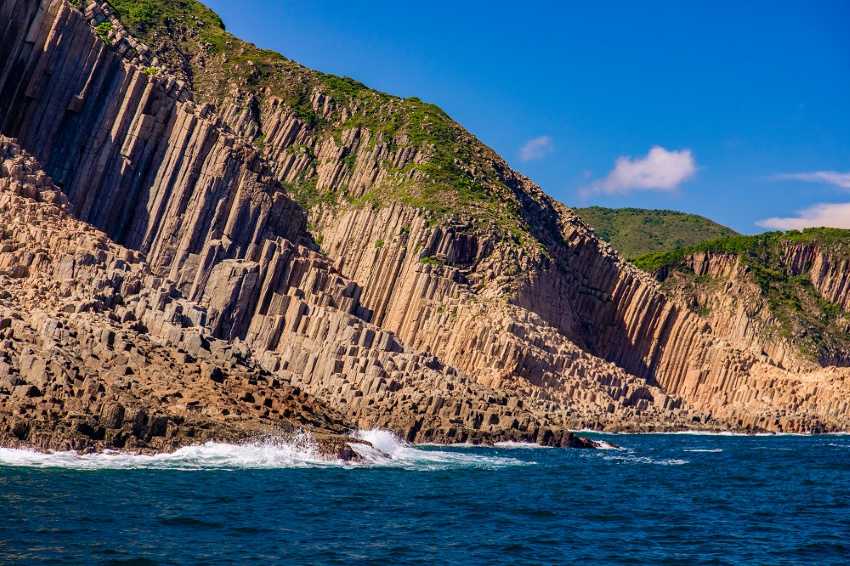Published on
October 4, 2025
Because of the significant ecological harm that has been documented in the area, environmentalists and local authorities are alarmed by the thousands of visitors that flocked to Sai Kung Geopark over the National Day holiday. One of Hong Kong’s most valued natural assets, the park’s delicate ecosystems have suffered greatly from the growing number of visitors, which is now unsustainable.
Well-known environmental organization Greenpeace recently released research describing the harm done to Sharp Island, a crucial site within the geopark. More than 4,000 visitors flooded the island on the first day of the vacation, overwhelming both its natural environment and infrastructure. Illegal fires, littering, and the gathering of marine life, including sea urchins and starfish, were among the activities mentioned; these all contribute to the area’s degradation. These activities pose a serious threat to the island’s environment, particularly the coral reefs, which could suffer irreversible harm if left unchecked.
Ecotourism: A Balancing Act for Hong Kong
The stark reality of the situation has led to a call for immediate action to protect Sai Kung’s fragile environment. In response to the environmental crisis, Greenpeace has urged the Hong Kong government to reconsider its current approach to ecotourism. The group criticizes the government’s policies as piecemeal and unsystematic, highlighting the need for a comprehensive strategy that takes into account both conservation and tourism.
Sai Kung is home to some of Hong Kong’s most biodiverse natural landscapes, including Sharp Island, which features the second-highest coral coverage in the region. These coral reefs, which are essential to marine biodiversity, have already begun to show signs of stress due to the unregulated activities of tourists. The coral reefs are a vital part of the ecosystem, supporting various marine species. Without proper protection, these ecosystems may face irreversible harm.
The rise in tourist numbers during peak seasons, such as the National Day holiday, has put the environment under undue pressure. Activities like snorkeling in coral-rich areas, coupled with unsupervised collection of marine species, have led environmentalists to warn that the once-pristine environment could deteriorate beyond recovery.
The Need for Sustainable Tourism Practices
In light of these findings, Greenpeace advocates for the introduction of a strict ecotourism policy framework. This would involve conducting a carrying capacity study for the islands in Sai Kung to understand the maximum number of visitors the area can sustain without causing ecological harm. Additionally, conservation and management measures must be put in place, including restrictions on the number of visitors allowed on the islands and limitations on specific recreational activities.
These strategies would help preserve the biodiversity of Sai Kung Geopark and ensure that tourism does not come at the cost of its natural beauty. It is essential for the government to strike a balance between promoting tourism and protecting the environment. A sustainable approach to tourism can not only safeguard the area’s ecosystems but also promote a long-term, thriving tourism industry that benefits both local communities and visitors alike.
Local Authorities Speak Out on Tourism’s Impact
Local leaders have expressed concern over the rising environmental challenges brought on by tourism. Christine Fong Kwok-shan, a District Councillor for Sai Kung, has highlighted the contrast between the government’s push for “civilized tourism” in mainland China and the actions of a minority of tourists who disregard local ecological guidelines. While the government has already implemented measures to educate visitors, such as signage in key locations, these efforts have proven insufficient in curbing the damage caused.
The issue of excessive signage has been raised by local authorities, who believe it could impact the natural landscape of Sai Kung. Instead of increasing the number of signs, they suggest alternative methods, such as distributing leaflets or posters at key entry points like the Ferry Pier to Sharp Island. Such initiatives would help raise awareness about the importance of respecting the environment, without compromising the visual appeal of the landscape.
The Role of Government and Visitors in Conservation
While the local government has taken steps to curb the negative impact of tourism, it is clear that more needs to be done to preserve the environment of Sai Kung Geopark. Comprehensive measures, such as better enforcement of existing regulations and the introduction of new policies to regulate the flow of tourists, are essential to ensure that the geopark’s fragile ecosystems can be sustained for future generations.
Additionally, there is a need for greater awareness and education among tourists themselves. Visitors to the region, especially those coming from mainland China, may not always be familiar with local environmental practices and the fragility of the ecosystem. Therefore, targeted educational campaigns should be launched, aimed at teaching tourists how to behave responsibly in such ecologically sensitive areas.
Government authorities could also consider implementing a reservation system for popular spots like Sharp Island, limiting the number of visitors allowed at any given time. This would help control overcrowding and ensure that tourists can enjoy the area without compromising its ecological integrity.
The Path Forward for Ecotourism in Hong Kong
Both environmental preservation and the tourism sector face serious challenges as a result of Sai Kung Geopark’s explosive growth in visitors. A change to more environmentally friendly tourism methods is required to protect the area’s natural beauty. This includes creating a strong ecotourism policy that prioritises protecting the environment while responsibly hosting visitors.
To make sure that the park’s delicate ecosystems are not harmed by the increasing number of visitors, the government, local government, and environmental organisations must cooperate. Hong Kong can keep drawing visitors to Sai Kung Geopark while guaranteeing that it is a stunning and ecologically varied destination for many years to come by putting policies in place to restrict the number of visitors, enforce rules, and increase awareness.
[Image Source: Hong Kong UNESCO Global Geopark Official Website]



